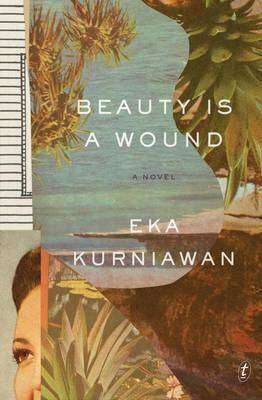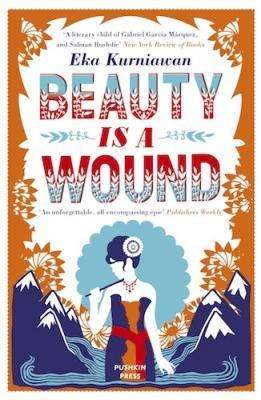BEAUTY IS A WOUND by Eka Kurniawan, Review: Uniquely appealing
Beauty is a Wound is the first of Indonesian author Eka Kurniawan’s novels to be translated into English.

Beauty is a Wound Synopsis:
Compulsively readable, Beauty Is a Wound combines history, satire, family tragedy, legend, humour, and romance in an astonishing epic novel, in which the beautiful Indo prostitute Dewi Ayu and her four daughters are beset by every monstrosity.
Kurniawan’s gleefully grotesque hyperbole is a scathing critique of his young nation’s troubled past: the rapacious offhand greed of colonialism; the chaotic struggle for independence; the 1965 mass murders, followed by three decades of Suharto’s despotic rule. Drawing on local sources—folk tales and the all-night shadow puppet plays, with their bawdy wit—and inspired by Melville and Gogol, Beauty Is a Wound is passionate and ironic, exuberant and confronting. Hailed as ‘the next Pramoedya’, Eka Kurniawan is an exciting new voice in contemporary literature.
English language translation by Annie Tucker
Disclosure: If you click a link in this post we may earn a small commission to help offset our running costs.
Sign up to our Booklover Book Reviews emails and receive our gift for new subscribers. LEARN MORE >>
BOOK REVIEW
I’ve taken a few days to digest and distil my thoughts after reading Beauty is a Wound. Why? Several of my observations about this work could in a traditional sense be deemed weaknesses, but in the spirit of its title, Eka Kurniawan has brought these elements together in a way that is uniquely appealing.
I had the pleasure of seeing Kurniawan speak at the Brisbane Writers Festival, and there, much like in his interview with Text’s Alice Lewinsky he explained his principal intention was to write a ghost story, rather than how many have interpreted it as ‘a metaphor for Indonesia’s troubled history’. However, in my opinion Beauty is a Wound is most successful as the latter.
Characterization
Initially, I was enthralled by this wonderful opening passage,
One afternoon on a weekend in March, Dewi Ayu rose from her grave after being dead for twenty-one years. A shepherd boy, awakened from his nap under a frangipani tree, peed in his shorts and screamed, and his four sheep ran off haphazardly in between stones and wooden grave markers as if a tiger had been thrown into their midst. It all started with a noise coming from an old gravesite with an unmarked tombstone covered in knee-high grass, but everybody knew it was Dewi Ayu’s grave. She had passed away at fifty-two, rose again after being dead for twenty-one years, and from that point forward nobody knew exactly how to calculate her age.
and comfortable with the ghost story categorisation. But, as the scope and focus of the novel expanded and the depth of characterisation reduced I came to see the characters more like caricatures — clever representations of the myriad of players involved in Indonesia’s tumultuous history — even down to the contradictory stances taken by different elements over time. All have the capacity for greatness and weakness, and sometimes fickle circumstance can determine what comes to the fore.
That said, I do not think all tenuous linkages between the many story threads that combine to form this novel and jarring turns of phrase can be categorised as artifice — although their source, either in the original text or via translation, is impossible for me to say.
 Dark humour
Dark humour
When it comes to humour, I’m a fan of the darker and deadpan variety, and Beauty is a Wound contains some great examples of it. The way I see it, generally speaking you have two choices in the face of evil stemming from ignorance or rank stupidity — where possible, I’ll choose tears of laughter.
The content within Beauty is a Wound, surreal or otherwise, is not for the faint-hearted – there is violence to excess, including rape of women written off almost as inconsequential – immense suffering, torture and other forms of depravity. And while they themselves are acts/attitudes I deplore, the stoicism and sense of ingenuity and resilience of human character in the face of swiftly changing ideology and fortunes their inclusion illustrated in respect to the people of Indonesia, really struck a chord with me.
Eka Kurniawan’s Beauty is a Wound can be read as compelling entertainment or deep philosophy. Indeed it has received exceedingly high praise from the reviewing establishment, with the likes of New York Review of Books describing as ‘a literary child of Gabriel Garcia Marquez and Salman Rushdie’. For me it was a powerful reminder of all that nation’s people had to ‘survive’ over the last century, and how little many of us here in Australia really know about one of our closest neighbours, beyond the headlines.
BOOK RATING: The Story 4.5 / 5 ; The Writing 3.5 / 5 — Overall 4
Get your copy of Beauty is a Wound from:
Genre: Historical, Drama, Romance, Action-Adventure, Mystery, Fantasy, Literature, Translation
UPDATE: This title since been released in audiobook format narrated by Jonathan Davis (listen to an audio sample), and by New Directions Publishing (US) and Pushkin Press (UK), and included in LitHub’s 10 Best Translated Novels of the Decade.
About the Author, Eka Kurniawan
Eka Kurniawan was born in 1975 and is the author of novels, short stories, essays, movie scripts, and graphic novels. He has been described by the Jakarta Post as ‘one of the few influential writers in Indonesia.’ His novel Man Tiger was longlisted for the 2016 Man Booker International Prize. Check out Eka Kurniawan’s official website.
Beauty is a Wound won The World Readers Award 2016 and several ‘Best of 2015 Lists’ including Publishers Weekly’s Best Books of 2015 and The New York Times’ 100 Notable Books of 2015.
Translator, Annie Tucker
Annie Tucker won a PEN/Heim Translation Fund Award for this translation, and discusses what drew her to the novel in this article.
* My receiving a copy of Beauty is a Wound from Text Publishing for review purposes did not impact the expression of my honest opinions in the review above.
